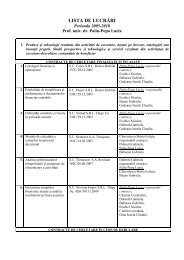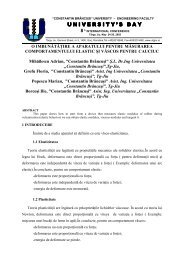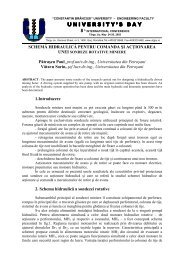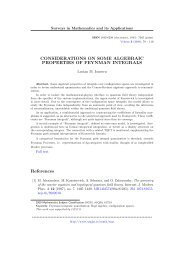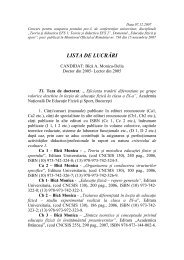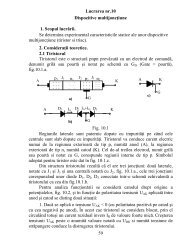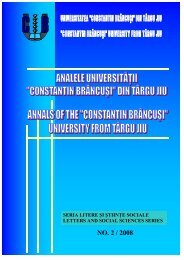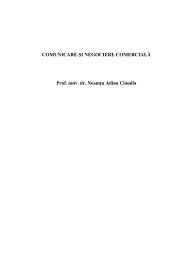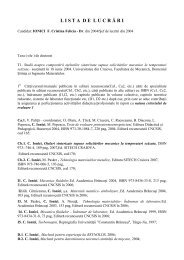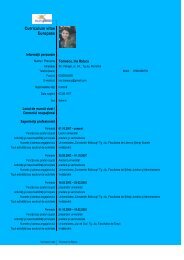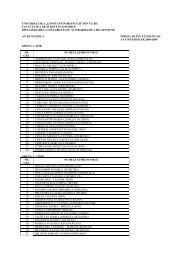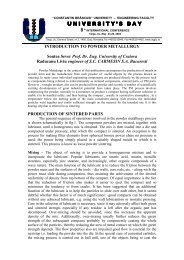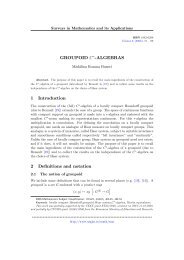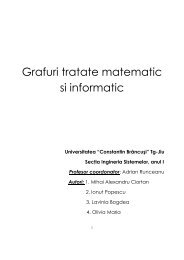UN PARADOX AL MODERNITĂŢII Lect. univ. dr. Curelar Mirabela ...
UN PARADOX AL MODERNITĂŢII Lect. univ. dr. Curelar Mirabela ...
UN PARADOX AL MODERNITĂŢII Lect. univ. dr. Curelar Mirabela ...
Create successful ePaper yourself
Turn your PDF publications into a flip-book with our unique Google optimized e-Paper software.
Analele Universităţii “Constantin Brâncuşi” din Târgu Jiu, Seria Litere şi Ştiinţe Sociale, Nr. 1/2009<br />
paradoxal de direct, care merge până la<br />
limita terifiantului şi absurdului.<br />
Putem susţine ideea unicităţii<br />
fantasticului caragialian, care, spre<br />
deosebire de fantasticul lui Eminescu sau<br />
Creangă, este saturat de magie şi<br />
ambiguitate. La Caragiale, legile<br />
supranaturalului se hrănesc din superstiţii<br />
populare sau din legende, iar existenţa<br />
umană, în deplină convieţuire cu personajele<br />
malefice, apare doar ca o uşoară ciudăţenie,<br />
explicabilă raţional. Această pendulare<br />
comico-tragică între real şi fantastic, conferă<br />
prozei caragialiene o savoare şi o<br />
autenticitate românească. Dacă la Eminescu<br />
sau Creangă fantasticul este firav, estetic,<br />
cosmetizat, presărat de frumuseţe şi reţinere,<br />
precum în basmele cu zâne şi feţi frumoşi, la<br />
Caragiale fantasticul este situat la polul<br />
opus, fiind aglomerat de personaje malefice,<br />
duhuri diavoleşti, practici vrăjitoreşti şi<br />
superstiţii populare care pot schimba<br />
destinele oamenilor. Chiar şi personajele<br />
feminine, care, prin natura lor umană ar fi<br />
constituit frumuseţea şi fragilitatea, la<br />
Caragiale, femeia uzează de o virtuozitate<br />
demonologică, frumuseţea sa fiind un atu al<br />
puterii diavoleşti şi nu al fragilităţii<br />
angelice. În nuvelele lui Caragiale, bărbatul<br />
este cel firav, supus, întotdeauna situat în<br />
inferioritatea femeii, chiar şi atunci când el<br />
este însuşi diavolul (Kir Ianulea).<br />
Critica literara a stabilit o<br />
corespondenţă între <strong>dr</strong>amaturgia lui<br />
Caragiale şi proza sa scurtă, urmărind<br />
<strong>univ</strong>ersul Momentelor şi schiţelor. Revanşa<br />
prozatorului vine în completarea<br />
<strong>dr</strong>amaturgiei sale. Întreaga operă a lui<br />
Caragiale este, simultan, un semn al realului<br />
dar şi o acceptare, prin ironie, a complexului<br />
fantastic, în care autorul este tentat să<br />
evadeze.<br />
Miticismul lui Caragiale dezvoltă<br />
esenţe, subliniază iluzoriul şi convenţionalul<br />
unei lumi reale, dar îşi propune totodată o<br />
aerisire în plan spiritual, căci personajul îşi<br />
aplică uneori o etichetă de ilar şi tembel,<br />
care îi reduce imaginea realistă. El poate fi<br />
to the limit of the terrifying aspect and the<br />
absurdity.<br />
We may maintain the oneness idea of<br />
the Caragialian fantasy that, unlike<br />
Eminescu’s or Creangă’s fantasy, is<br />
saturated by magic and ambiguity. At<br />
Caragiale, the supernatural’s rules are<br />
supplied by popular superstitions or legends<br />
and the human existence, living together<br />
with the malefic characters, appears only as<br />
a slight, reasonably explicable oddity. This<br />
comical-tragic vacillation between reality<br />
and fantasy offers the Caragialian prose a<br />
Romanian taste and authenticity. If, at<br />
Eminescu or Creangă, the fantasy is fragile,<br />
aesthetic, covered, surrounded by beauty<br />
and restraint, like in the tales with princes<br />
and fairies, at Caragiale, the fantasy is<br />
placed at the opposite pole, being crowded<br />
by malefic characters, devilish spirits,<br />
witches’ practices and popular superstitions<br />
that can change the humans’ destinies. Even<br />
the feminine characters that, by their human<br />
nature would constitute beauty and fragility,<br />
at Caragiale, the woman uses a devilish<br />
virtuosity, her beauty being an advantage of<br />
the devilish power and not of the angelic<br />
fragility. In Caragiale’s short-stories, the<br />
man is the fragile one, the obedient one,<br />
always placed in the woman’s inferiority,<br />
even when he is the devil himself.<br />
The literary critique established a<br />
correspondence between Caragiale’s <strong>dr</strong>ama<br />
and his short prose, following the <strong>univ</strong>erse<br />
of the Moments and Sketches. The prose<br />
writer’s revenge completes his <strong>dr</strong>ama.<br />
Caragiale’s entire work is simultaneously a<br />
sign of the realism but also an ironical<br />
acceptation of the fantastical complex where<br />
the author is tempted to escape.<br />
Caragiale’s mythical aspect develops<br />
essences, emphasizes the illusory and<br />
conventional aspect of a real world, but in<br />
the same time it wants a spiritual<br />
refreshment because the character is<br />
sometimes hilarious and stupid, fact that<br />
reduces its realist image. It can be used also<br />
in the fantastical stories where the<br />
Annals of the „Constantin Brâncuşi” University of Târgu Jiu, Letters and Social Sciences Series, Issue 1/2009<br />
100



